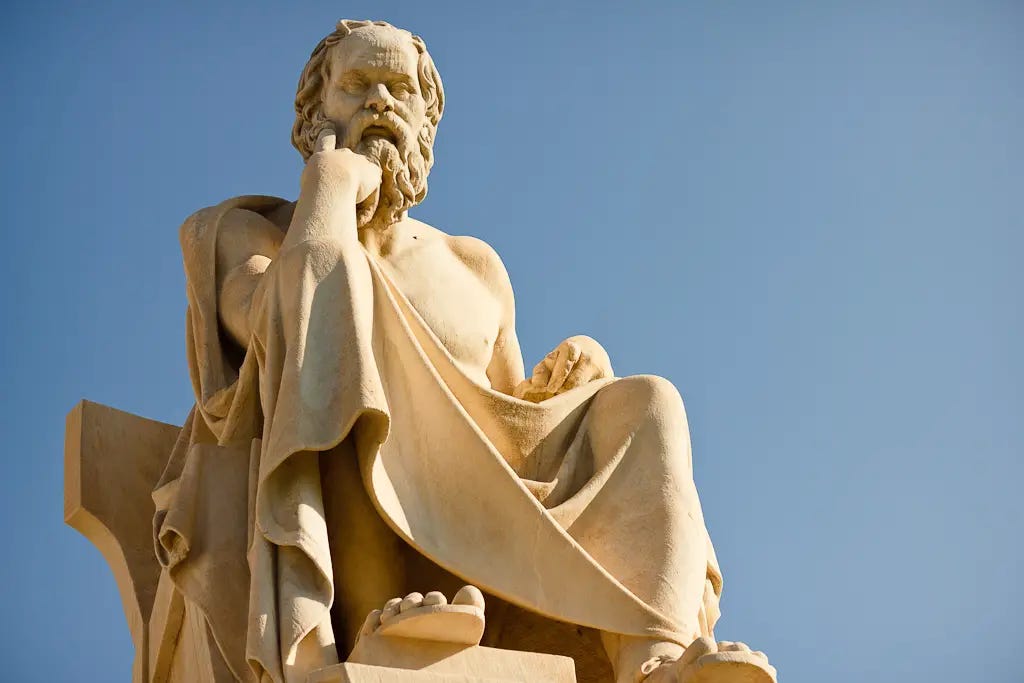A scientist friend in England and I are working on an introduction to critical thinking. This short book will explore the fundamentals of logical reasoning, self-evaluation, identifying biases, and understanding the limits of our knowledge. One key technique in critical thinking is the Socratic method.
The Socratic method is a fundamental tool in critical thinking that uses questioning and dialogue to uncover assumptions, expose contradictions, and refine understanding. Named after the ancient Greek philosopher Socrates, this method challenges people to think deeply, question their beliefs, define their terms precisely, and arrive at well-reasoned conclusions. It is a common method of teaching in the West, both at universities and K-12 schools.
One of its key benefits is revealing the complexity of issues that cannot be answered with simple responses. For example, many definitions of terms like "racism" or “moral” are often incomplete or misleading. The Socratic Method helps break down these concepts, encouraging deeper analysis.
How the Socratic Method Works
The Socratic Method follows a structured approach:
Questioning Assumptions – A commonly held belief is critically examined.
Clarification – The individual must define their terms and explain their reasoning.
Challenging Logical Consistency – Further questioning reveals contradictions, gaps, or inconsistencies.
Reevaluation and Refinement – The original belief is revised or refined in response to the discussion.
Rather than providing direct answers, this method encourages people to scrutinize their own beliefs and refine their reasoning. Socrates saw his role not as a teacher but as an inquirer who, through questioning, exposed gaps in knowledge and understanding.
By engaging in this type of questioning, people critically analyze their assumptions and refine their viewpoints. The goal is not to "win" an argument but to arrive at a clearer, more nuanced understanding of an issue. The person asking the question often learns and refines their beliefs along the way, and people lean to ask themselves these questions.
Example of Socratic Questioning
Here are some Socratic questions in response to the statement "All swans are white":
How do you know that all swans are white?
Have you seen every swan that exists?
Are there any historical records or scientific studies that document swans of other colors?
If someone claimed to have seen a black swan, how would that affect your belief?
Could there be swans in regions you haven’t explored that are not white?
Does your belief come from direct observation, or is it based on what others have told you?
What would be the implications if even one swan were found to be black?
Has this claim always been true, or is it possible that new discoveries could change our understanding?
If we define a swan as only a white bird, would a black swan still be considered a swan?
This approach forces the person to critically examine their claim and consider possible exceptions or limitations in their beliefs or claims.
A Classic Example: Socratic Dialogue in Euthyphro
In Plato’s Euthyphro, Socrates questions Euthyphro about piety. Euthyphro defines piety as "what is dear to the gods." Socrates then asks:
"Are piety and impiety opposites?"
"Do the gods ever disagree on what is good and just?"
"If different gods love and hate the same actions, can those actions be both pious and impious?"
Through this dialogue, Euthyphro realizes his definition of piety is inconsistent.
The Importance of the Socratic Method
The Socratic Method is crucial for developing critical thinking skills because it:
Encourages self-examination – People become more aware of their assumptions and biases.
Uncovers flawed reasoning – Logical inconsistencies and contradictions are exposed through dialogue.
Promotes open-minded discussion – Instead of confrontation, the method fosters intellectual exploration and collaboration.
Enhances learning – Used in education, law, and philosophy, it helps people think systematically about complex topics.
Socratic Questioning Techniques
Here are different types of Socratic questions that can enhance critical thinking:
Clarification Questions
What do you mean by that?
Can you give me an example?
How does this relate to what we discussed earlier?
Could you explain that in another way?
Challenging Assumptions
What assumptions are you making?
How do you know that’s true?
What if we assumed the opposite?
Is there another way to interpret this?
Probing for Evidence and Reasoning
What evidence supports your claim?
How did you come to that conclusion?
Are there any studies or data that support this?
Can you think of any counterexamples?
Exploring Alternative Perspectives
What would someone who disagrees with you say?
Why might someone see this differently?
How does this perspective compare with others?
What are the strengths and weaknesses of your position?
Examining Consequences and Implications
What are the consequences if this is true?
How does this affect other ideas or beliefs?
If we accept this argument, what else must we accept?
What happens if everyone believed this?
Encouraging Self-Reflection
Why do you believe that?
What led you to this conclusion?
Have you always thought this way, or has your perspective changed?
What might make you reconsider your position?
Application in Everyday Life
The Socratic Method is not limited to philosophy classrooms; it can be applied in daily conversations, debates, and decision-making. By incorporating the Socratic Method into your thought process, you can sharpen your reasoning, challenge assumptions, and develop a more disciplined approach to thinking and learning.
Video:
A brief outline of how to use the Socratic method
A lengthy lecture to teachers on the Socratic method by Stanford University professor Rob Reich




